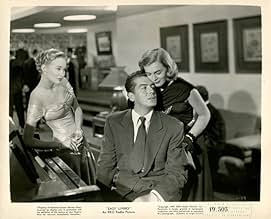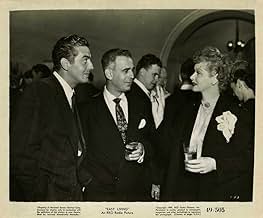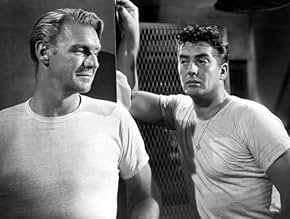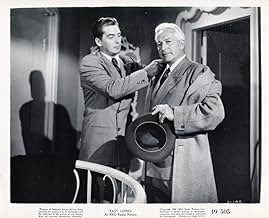IMDb RATING
6.3/10
1.1K
YOUR RATING
Star footballer Pete Wilson faces a career-threatening condition. His wife Liza enjoys the glamorous lifestyle, while shunning has-beens. His friend Tim retired to coach. Pete only knows foo... Read allStar footballer Pete Wilson faces a career-threatening condition. His wife Liza enjoys the glamorous lifestyle, while shunning has-beens. His friend Tim retired to coach. Pete only knows football.Star footballer Pete Wilson faces a career-threatening condition. His wife Liza enjoys the glamorous lifestyle, while shunning has-beens. His friend Tim retired to coach. Pete only knows football.
Richard Erdman
- Buddy Morgan
- (as Dick Erdman)
Jim Backus
- Dr. Franklin
- (as James Backus)
- Director
- Writers
- All cast & crew
- Production, box office & more at IMDbPro
Featured reviews
It is difficult to determine where this story is set -- period. The sports team in "Easy Living" is the Chiefs, the helmets worn by this teams are those of the Rams, but yet this team (and ultimately, this story) is based in New York City.
Well, the Kansas City Chiefs began as the Dallas Texans and never existed as a franchise in New York City. The St. Louis Rams, and their iconic ram horn helmet design, has only been seen in three markets, Cleveland, Los Angeles and St. Louis. Again, a club that was never in New York City.
It is also more than odd that the main character, a quarterback, wears number 66, not a customary number for a quarterback to wear. But, it is this lack of accurate detailing that reveals a project mired in vagaries.
These type of historical inaccuracies reveal a more deep-seated lack of focus from this film. Despite its promise, Easy Living just lacks any type of focus. The plot slides around seemingly unsure of where it wants to go or needs to go. primarily, the essential points in the plot development are buried behind a lot of pointless distractions...and characters.
This perpetually 'out-of-focus' plot is enhanced by dialog which is trite, and contrived. It seems the writers of this screenplay were hellbent on being melodramatic and vague.
The movie seems to starts somewhere in the middle. Unfortunately, Easy Living runs like a stage play that is missing too many essential scenes, not just the beginning!
Well, the Kansas City Chiefs began as the Dallas Texans and never existed as a franchise in New York City. The St. Louis Rams, and their iconic ram horn helmet design, has only been seen in three markets, Cleveland, Los Angeles and St. Louis. Again, a club that was never in New York City.
It is also more than odd that the main character, a quarterback, wears number 66, not a customary number for a quarterback to wear. But, it is this lack of accurate detailing that reveals a project mired in vagaries.
These type of historical inaccuracies reveal a more deep-seated lack of focus from this film. Despite its promise, Easy Living just lacks any type of focus. The plot slides around seemingly unsure of where it wants to go or needs to go. primarily, the essential points in the plot development are buried behind a lot of pointless distractions...and characters.
This perpetually 'out-of-focus' plot is enhanced by dialog which is trite, and contrived. It seems the writers of this screenplay were hellbent on being melodramatic and vague.
The movie seems to starts somewhere in the middle. Unfortunately, Easy Living runs like a stage play that is missing too many essential scenes, not just the beginning!
A profesional football player is confronted with terrible medical diagnosis. He is only a fottball player ; too late to become someone else. It is high paid, preocuped by the happiness of his wife ( preocuped, herself, by only her succes ) , losing the opportunity to be the new couch of team and feeling his life empty, decided to hide his health problems and accepting be mocked by his team mates for not brilliant succeses in games.
Victor Mature proposes a fair portrait of Pete Wilson and he was the main motif for see this film in my case. But the revelation remain Lucille Ball as Anne and, no surprises , Sonny Tuffts.
In short, a good, in some measure, maybe, useful film.
Victor Mature proposes a fair portrait of Pete Wilson and he was the main motif for see this film in my case. But the revelation remain Lucille Ball as Anne and, no surprises , Sonny Tuffts.
In short, a good, in some measure, maybe, useful film.
Pete Wilson, also known as King Football, faces a dual crisis. Diagnosed with a serious heart ailment, he learns his career is over. Wilson also must break the news to his star-struck wife, who enjoys the spotlight even more than he does.
"Easy Living" is of course an ironic title. Wilson's life, as a quarterback and as a husband, is anything but easy. As the story evolves, he must come to terms with both the loss of his livelihood and the possible end of his marriage. Victor Mature, who played gladiators both ancient and modern, does his best but he isn't quite up to the emotional demands of the role. And Lizabeth Scott, ever the ice princess, never comes across as Wilson's wife. The supporting cast, featuring Lloyd Nolan as the head coach and Lucille Ball as his son's widow, is generally stronger. Jack Paar, in one of his rare film roles, pops up as the team's PR man.
The film's climax, in which Wilson slaps his wife in desperation, could never be made today but still was acceptable in 1949. Frankly though, you can't help share Wilson's frustration with this frivolous woman and you have to wonder what you would do in his place.
Highly recommended, both as a study of mid-century social attitudes and for an early Hollywood view of the NFL
"Easy Living" is of course an ironic title. Wilson's life, as a quarterback and as a husband, is anything but easy. As the story evolves, he must come to terms with both the loss of his livelihood and the possible end of his marriage. Victor Mature, who played gladiators both ancient and modern, does his best but he isn't quite up to the emotional demands of the role. And Lizabeth Scott, ever the ice princess, never comes across as Wilson's wife. The supporting cast, featuring Lloyd Nolan as the head coach and Lucille Ball as his son's widow, is generally stronger. Jack Paar, in one of his rare film roles, pops up as the team's PR man.
The film's climax, in which Wilson slaps his wife in desperation, could never be made today but still was acceptable in 1949. Frankly though, you can't help share Wilson's frustration with this frivolous woman and you have to wonder what you would do in his place.
Highly recommended, both as a study of mid-century social attitudes and for an early Hollywood view of the NFL
Victor Mature plays the star quarterback of the Rams and he's on top of the world. Unfortunately, after feeling some twinges, his doctor discovers Vic has a heart defect and might easily die if he continues playing. Well, at first it's a no-brainer, as he plans on retiring and taking up coaching. Unfortunately, these plans are put on hold when he tries to tell his selfish shrew of a wife (Lizabeth Scott) about this. She makes it VERY clear that she loves him because of all the money and glory he gets from football AND if he were to quit, she might just walk! Nice lady, huh?! Lucille Ball plays a supporting role as a nice lady who deeply cares for Vic and is just waiting in case the marriage fizzles. However, how all this marital discord is finally solved is amazing and could NEVER be done in films today, as Vic finally gets sick of Lizabeth's petulant ways and slaps her silly--saying to either shut up and stay or walk!!! This is a small picture with a modest cast and budget, but I have really enjoyed watching it repeatedly. Part of it is because there are few films about pro football (especially when this one was made) and because as I watch the big climax scene between Victor Mature and Lizabeth Scott, I love to imagine the horror on many viewers faces as they see Vic slap his awful wife right in the face! Believe me, most viewers will probably LIKE seeing this, as she's one of the most selfish and awful wives in film history. Now I am NOT recommending men slug their wives, but in this age of extreme political correctness, I occasionally like to see a film that is sure to offend a lot of high-strung viewers! If you take out this possibly offensive scene, it's still a dandy movie--well worth a look. An interesting story and one of Mature's better films.
Easy Living is not a light comedy, despite the presence of Lucille Ball, Jim Backus and Jack Paar. Neither is it really a sports movie, though it's set in the world of professional football. Irwin Shaw wrote the novel on which it's based the story of a man who's approaching midlife knowing nothing but how to play ball. The movie version proves surprisingly textured and involving, which ought not to be surprising, as the director is the ever resourceful Jacques Tourneur.
Victor Mature is a New York gridiron hero whose game is starting to slow down; in fact, he finds out he has a heart ailment which spells early death if he keeps on playing. But his quest for a cushy coaching job is handicapped by his ambitious wife (Lizabeth Scott). She's not cut out for the den-mother duties a coach's wife must shoulder, as she's trying to make a success of her interior design business despite her own handicap of commanding neither taste nor talent a handicap she overcomes by luring monied clients romantically. So in addition to his health and career crises, Mature faces a marital one as well.
The large cast includes Lloyd Nolan as the club's owner and Lucille Ball as his widowed daughter-in-law, who works for the team and nurtures a crush on Mature. Tourneur shows his craft in coaxing a subdued and touching performance from her; he surpasses that by drawing from Scott, especially in a self-pitying drunk scene, the only piece of real acting she ever committed to film.
Easy living ends too abruptly (it clocks in at only 78 minutes) but there's nary a false note or a slack stretch in it. Made near the peak of the noir cycle, which accounts for its minor-key tonality (the score, by the way, is by Roy Webb), it springs yet another surprise in being one of the first films to find a dark side in that American institution, professional football.
Victor Mature is a New York gridiron hero whose game is starting to slow down; in fact, he finds out he has a heart ailment which spells early death if he keeps on playing. But his quest for a cushy coaching job is handicapped by his ambitious wife (Lizabeth Scott). She's not cut out for the den-mother duties a coach's wife must shoulder, as she's trying to make a success of her interior design business despite her own handicap of commanding neither taste nor talent a handicap she overcomes by luring monied clients romantically. So in addition to his health and career crises, Mature faces a marital one as well.
The large cast includes Lloyd Nolan as the club's owner and Lucille Ball as his widowed daughter-in-law, who works for the team and nurtures a crush on Mature. Tourneur shows his craft in coaxing a subdued and touching performance from her; he surpasses that by drawing from Scott, especially in a self-pitying drunk scene, the only piece of real acting she ever committed to film.
Easy living ends too abruptly (it clocks in at only 78 minutes) but there's nary a false note or a slack stretch in it. Made near the peak of the noir cycle, which accounts for its minor-key tonality (the score, by the way, is by Roy Webb), it springs yet another surprise in being one of the first films to find a dark side in that American institution, professional football.
Did you know
- TriviaThe white football seen in the warm-ups for the night game at the end of the film was used in the NFL for such games from 1929 to 1955. It was considered to be more visible to the players and fans than the typical brown football. By 1956 better stadium lighting, especially needed for television, made the white football obsolete.
- GoofsThough the team's name is the Chiefs, their helmets have horns on them like the NFL's Los Angeles Rams.
- ConnectionsFeatured in After the Fox (1966)
- How long is Easy Living?Powered by Alexa
Details
- Runtime
- 1h 17m(77 min)
- Color
- Aspect ratio
- 1.37 : 1
Contribute to this page
Suggest an edit or add missing content






































